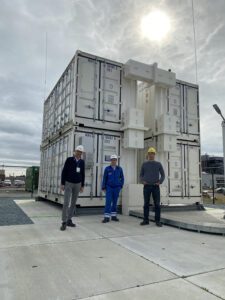BASF New Business GmbH (BNB) has successfully started up a system comprising four NAS battery containers, which have been integrated into the electricity grid at BASF’s Verbund site in Antwerp, Belgium. With this long-term project in Antwerp, the BASF team wants to test various operating scenarios and further explore the potential of NAS batteries. NAS batteries are sodium-sulfur batteries with high energy content that are designed for stationary electricity storage. Since 2019, BNB has been cooperating in this segment with the Japanese ceramics manufacturer NGK Insulators Ltd. to market and further develop NAS batteries.

The NAS system in Antwerp (Source: BASF)
“By having our own battery system, we gain direct experience in long-term operations of energy storage systems and we can vary and test the associated infrastructure. We can also examine various use cases and business models. This enables us to advise our customers even more comprehensively in the planning and implementation of their projects and to collect important data for further development,” said Frank Prechtl, Director of E-Power Management at BNB.
The battery system in Antwerp has an energy storage capacity of 5.8 megawatt hours (MWh) and a total output of 950 kilowatts (kW). Power electronics, including a power conversion system (PCS), are needed in order to use the electrical energy stored in the battery. The Swiss company Indrivetec AG has developed a power conversion system for NAS® batteries that has been installed in Antwerp and will be showcased at the ees (Electrical Energy Storage) Europe trade fair in Munich from October 6-8, 2021. At booth B6.140, trade fair visitors can discuss the interaction of the PCS with the battery as well as the possible applications of the NAS battery system with experts from BNB and Indrivetec.
NAS battery systems support the increasing integration of fluctuating renewable energy sources, such as wind and solar, into the grid. NAS batteries can be charged when excess electricity is generated and then provide electricity at a time when demand is higher. They can supply large volumes of electrical energy over a period of four to eight hours and thus decouple electricity generation and demand. Furthermore, NAS batteries are used for the stabilization of electricity supply for industrial customers, grid upgrade deferral, and micro/off grids. Used in these applications, NAS batteries are an essential building block for implementing the energy transition.
For years, BASF has been intensely working on improving sodium-sulfur battery technology. NGK’s NAS battery was the world’s first commercialized megawatt-class battery with the capacity to store more than 1 MWh of electricity for hours. In 2019, BNB and NGK entered into sales partnership agreement for NAS® batteries and a joint development agreement for next-generation sodium-sulfur batteries. To expand the application spectrum of NAS batteries and tap new markets, the two partners have been combining BASF’s outstanding chemistry know-how with NGK’s expertise in battery design and production. Via its global sales network, BNB markets tailor-made NAS battery systems and provides technical support for installation, startup, maintenance and ongoing operations.